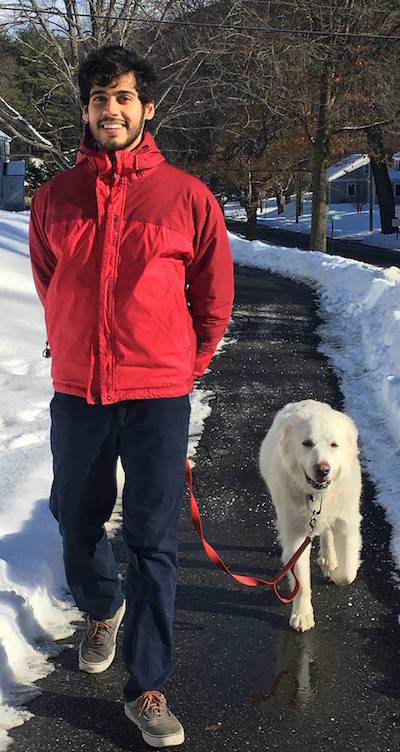
Harvard Business School’s 2+2 program allows current students, either in college or full-time masters programs, to apply for deferred admission to the MBA experience
Even Dvij Bajpai has to admit that a little bit of luck had to do with it.
Until almost the last moment, the Bombay-born Bajpai says he was undecided about applying to Harvard Business School’s 2+2 deferred admission program which allows students in college or full-time master’s programs to apply to the school’s MBA program. Successful applicants are then expected to enroll at HBS after racking up two to four years of professional work experience.
“It was midnight the day before the application was due and I didn’t have an essay,” laughs the 23-year-old Bajpai, who was in his final year of a dual-degree program in math and engineering with Amherst and Dartmouth colleges. He had already taken the GRE exam and started the application but had no idea what to write in the all-important required essay.
‘I BELIEVE IN YOU. YOU COULD DO THIS’
His friend, Tyler, was visiting him from Boston at the Dartmouth College campus and egged him on. “My best friend told me, ‘I believe in you. You could do this.’”
So the pair went for a drive around Hanover, N.H., in his friend’s Prius. “We just kept throwing ideas back and forth. We started trying to come up with a narrative and then it all clicked. But it was midnight and the application was due at 10 a.m. and I hadn’t started writing yet.”
Bajpai pulled an all-nighter, writing out the essay on his laptop as his friend slept soundly on a leather couch at Tuck’s Stell Hall. Finally, when the clock struck 6 a.m., the draft was done. He waited for Dartmouth’s career center to open to get some quick feedback on his work, did his final edits, and then handed the essay in just before the 10 a.m. deadline.
ONE OF 1,121 STUDENTS WHO APPLIED AND ONE OF ONLY 106 TO GET IN ON 2+2
Six weeks later last May, after an on-campus interview, he received a telephone call from Dee Leopold, then managing director of MBA admissions and now head of the school’s 2+2 program. “I was practicing piano in the basement of a building without cell service so I missed the call,” says Bajpai. Leopold sent him a congratulatory email, instead.He was elated. “I thought wow, I have been given an incredible opportunity and I want to make the most of it. I just felt a strange desire to go to the library and start working. I don’t kow how to describe it. I really want to spend the next four years learning as much as possible so I can eventually do something impactful back home in India.”
Bajpai was one of 1,121 students who applied to Harvard’s 2+2 program and one of only 106 who was admitted and committed to acquiring work experience before showing up as a first-year MBA student in three to four years.
The program boasts the same acceptance rate of 11% that confronts mainstream MBA applicants to Harvard, though the 2+2 cohort tends to be more heavily populated with STEM (science, technology, engineering and math) types and is slightly more domestic than Harvard’s regular MBA class. Some 60% of last year’s 2+2 commits boasted STEM backgrounds, versus 38% for the latest incoming HBS class, and 79% were domestic, compared to 65%.
‘IF YOU GET TURNED DOWN, IT JUST MEANS NOT NOW–BUT NOT FOREVER’
Leopold positions the program as a no-risk proposition for applicants. “You get the GMAT out of the way at the best time when you are still a student. The application fee is lower ($100 vs. $250), and you get the chance for self-reflection that is valuable. If you are interviewed and accepted, you get to experience something that is truly distinctive. If you get turned down, it just means not now—but not forever,” says Leopold who agrees to do what she calls “touchpoint calls” to candidates who are not admitted after the interview stage. Last year, she fielded about 40 such phone calls.
“I listen,” she says. “If there are insights that I tink would be helpful as they face other interviews or career searching, I offer them. I also try to make sure they hear loud and clear that the decision they received this year from HBS doesn’t mean never. 2+2 would not be a very well-designed program if it left talented and aspiring leaders felling that they had received a ‘final’ decision from HBS. If you don’t get in, we would hope to see you in another few years or at another business school. We hope it has whet your appetite for business school.”
Successful candidates agree with Leopold that the timing of the program can be ideal. Cecil Alfaro Mora, 23, a 2+2 admit, went to Northeastern University, graduating summa cum laude with a bachelor’s degree in industrial engineering last year. “I was always interested in doing an MBA and just waiting for the time to apply,” the Costa Rica native says. “I was wrapping up a solid internship with Apple and knew I could get a good letter of recommendation from my manager. I had good grades in college, and it was a good time for me to prepare for the GMAT. I was in study mode so it was easy for me to do the GMAT. I didn’t want to leave the application for later on in life.”












Questions about this article? Email us or leave a comment below.